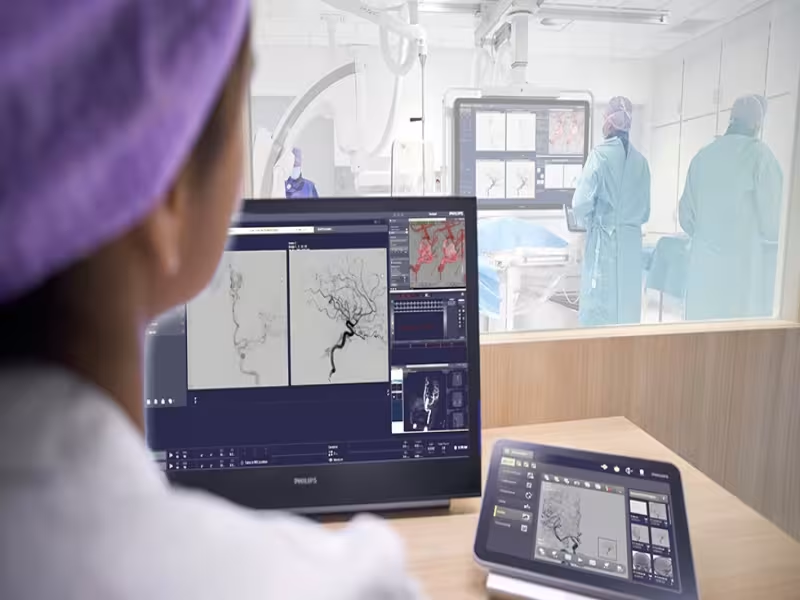
SHERIDAN, WYOMING – August 27, 2025 – Royal Philips and Indonesia’s Ministry of Health have signed multiyear agreements to deploy the Azurion image-guided therapy platform across all 38 provinces of the country, bringing minimally invasive cardiac, stroke, and cancer care to millions of patients. The rollout, part of the Strengthening Indonesia’s Healthcare Referral Network (SIHREN) project, is one of the most ambitious national health infrastructure initiatives in Southeast Asia.
Transforming Care with Image-Guided Therapy
The Azurion system enables interventional cardiologists, neurologists, and oncologists to perform complex procedures with precision while minimizing patient trauma. By replacing traditional open surgery with minimally invasive approaches, hospitals can reduce recovery times, complications, and overall costs. For Indonesia, where advanced therapies are often concentrated in major cities, the initiative represents a pivotal expansion of equitable access to high-quality care.
Bridging Healthcare Gaps Across 17,000 Islands
Indonesia’s geography has long been a barrier to consistent healthcare delivery. With a population of more than 280 million spread across 17,000 islands, equitable access to advanced care has been a pressing challenge. Most specialized treatment facilities are concentrated on Java, leaving remote and rural communities underserved.
The nationwide deployment of Azurion-equipped therapy rooms will:
- Expand advanced cardiac, stroke, and cancer care to hundreds of hospitals.
- Standardize treatment capabilities across urban and rural regions.
- Support the Ministry of Health’s long-term goal of building an integrated national referral system.
Industry Context: Rising Burden of Non-Communicable Diseases
Indonesia is facing a sharp rise in non-communicable diseases (NCDs), with heart disease, stroke, and cancer now leading causes of death. The economic toll is projected to reach USD 4.47 trillion in the coming decades. Globally, health systems are under pressure to address NCDs through earlier intervention and less invasive treatment methods. Indonesia’s adoption of advanced image-guided platforms positions the country in line with international best practices, while also showcasing how emerging markets can leapfrog infrastructure constraints through technology.
Philips’ Role and Strategic Commitment
Philips won the SIHREN tender through a competitive international bidding process, underscoring its market leadership in interventional imaging. The agreement includes not only the installation of equipment, but also services, workforce training, and integration with existing hospital infrastructure.
“Delivering better care for more people requires strong partnerships and the best innovations,” said Roy Jakobs, CEO of Royal Philips. “We’re honored to be Indonesia’s partner of choice to deliver our innovation directly where it's needed most. More patients in Indonesia will now have access to better care.”
Implications for Hospitals and Providers
For hospitals, the shift toward image-guided therapy translates into greater operational efficiency and improved patient outcomes. By leveraging real-time imaging and precision-guided procedures, providers can handle higher case volumes with reduced length of stay. This not only alleviates the strain on overcrowded urban centers but also empowers regional hospitals to deliver advanced interventions locally.
The agreements also include physician training programs, ensuring Indonesian healthcare professionals can effectively integrate the new technologies into daily workflows. This is expected to elevate both clinical standards and staff satisfaction, a critical factor in healthcare system resilience.
Strategic Outlook
Philips already employs more than 3,900 staff across Indonesia and operates a manufacturing facility in Batam, reflecting its deep commitment to the market. The company’s latest investment strengthens its long-term partnership with the government and aligns with the nation’s healthcare transformation agenda. With the SIHREN project supported by the World Bank and multilateral development banks, Indonesia is setting a precedent for how public–private collaboration can drive systemic healthcare improvements.
As Carla Goulart Peron, Chief Medical Officer at Philips, noted, “Minimally invasive care is life-changing for patients, unlocking treatment options that were once unimaginable. With small incisions, such targeted treatments can mean shorter hospital stays, fewer complications and quicker recoveries for patients.”
Conclusion
By expanding access to image-guided therapy nationwide, Indonesia is taking a decisive step toward tackling its most pressing health challenges. For Philips, the partnership solidifies its presence as a strategic enabler of healthcare transformation in Asia.
Learn more at Philips Healthcare.